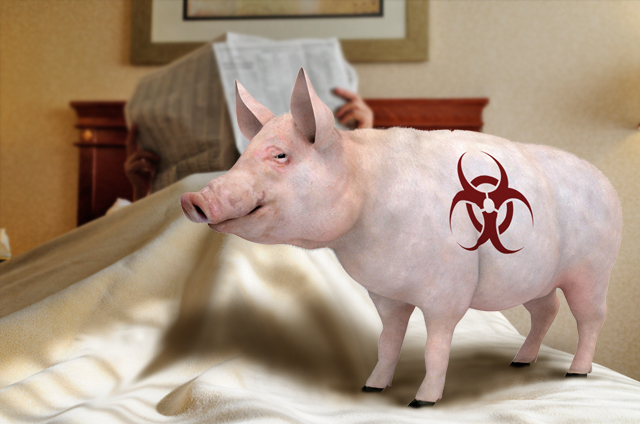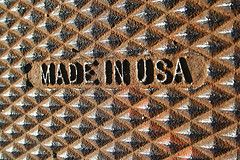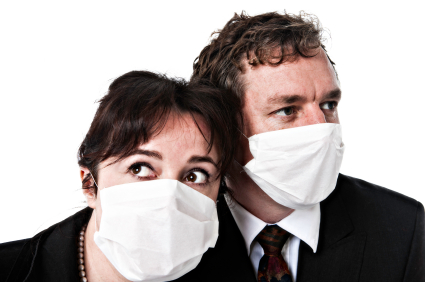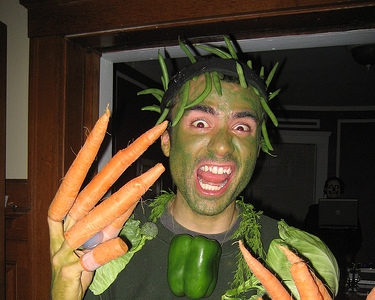livestock
-
While the West will have to eat less meat, Africa might have to eat more
Jim Motavalli of E/Environmental Magazine has a piece in Foreign Policy (!) on the difficulties we face in lowering meat consumption on any significant scale: …Giving up meat is tough, and arguing people into it is probably a losing proposition. Even with all the statistics out there about the dangers of meat, there are fewer […]
-
Another symptom of swine flu: instant amnesia
Photo illustration by Tom Twigg / Grist Swine flu: how very two weeks ago. Sure, H1N1 transmission is “still on the upswing” in the United States, and the World Health Organization warned that as much of a third of the globe’s population could eventually catch it, Reuters reported last week. But the disease is turning […]
-
CDC: swine flu strain has genetic roots in U.S.A.
(Another hat tip to the increasingly essential Tom Laskawy.) In an interview with Science Magazine, CDC chief virologist Ruben Donis essentially confirmed the reading of the current swine flu strain made by New Scientist: that it evolved from a strain that cropped up in U.S. hog farms in 1998. Both New Scientist and Donis emphasize […]
-
‘New Scientist’: Swine flu stems from virus that evolved in U.S.
In a pair of articles in New Scientist, Debora MacKenzie links the swine flu virus now spreading across the globe to large-scale pork-raising operations in the United States. In the first article, titled “Swine flu: the predictable pandemic?,” MacKenzie writes that the “virus has been a serious pandemic threat for years, New Scientist can reveal […]
-
Don’t jump to conclusions on swine flu and pork production
Editor’s Note: Tom Philpott’s April 28 piece on the swine flu pandemic, which raised the question of whether there is a link between the virus’ emergence in Mexico and the presence nearby of factory-scale pork farms, sparked a vigorous debate on the Society for Environmental Journalists listserv. Merritt Clifton was one of several writers to […]
-
Current flu virus may be 100% swine in origin
Everything swine and dandy?This intriguing notice posted to the International Society for Infectious Diseases by Columbia University researchers suggests that the current swine flu outbreak may be a “reassortment” (i.e. rearrangement) of existing swine flu viruses and not a swine, avian, and human influenza combo: The preliminary analysis using all the sequences in public databases […]
-
Eating your veggies doesn’t have to be scary
Tip #5: Eat your vegetables. Save some moolah (and Ma Earth) by switching out meat for veggies at least one day a week. Don’t let them sense your fear.Jeremy E.W. Fredericksen via Creative CommonsIt’s tried and true advice, from the USDA to First Lady Michelle Obama to your mom: Eat more veggies. Considering 78 percent […]
-
A love of delicious farm votes beef crosses ideological boundaries
In December, ranchers fell into a panic over a nonexistent EPA proposal to tax methane emissions from cows. By February, panic was replaced by giggling: how could they every have worried over something so crazy as a "cow tax"? And now, to demonstrate how badly misplaced their fears were, a Democratic and Republican Senator have joined together to enshrine in law the sacred principle that American cows shall never be taxed. Smell the bipartisanship.
Including cattle in a cap-and-trade system is, of course, a fine idea. From an environmental perspective, cattle are a major source of a wide range of ills: methane emissions, land use changes, nitrous oxide emissions, ammonia emissions, etc. If you tally up the negative impacts of beef on human health and productivity, the societal cost of cows climbs even higher.
From an economic efficiency perspective, it generally doesn't make sense to exclude sectors from a carbon cap. We want emissions reductions to come from the fastest, lowest-cost sources available, and it's hard to imagine anything cheaper or lower-cost than reduced beef consumption. It takes decades to shut down a coal plant. It takes no time at all to not eat a strip steak. Moreover, energy is a primary input to just about every sector of the economy. The same can hardly be said for tender, delicious short ribs.
-
Farmers take the hit as the CAFO model comes under pressure
In Meat Wagon, we round up the latest outrages from the meat and livestock industries.
-----
The industrial meat giants have entered a crisis phase.
As I've reported before, the world's biggest chicken packer, Pilgrim's Pride, is languishing in bankruptcy, squeezed by high feed costs, its own addiction to cheap capital from Wall Street, now dried up, and ruthless competition from rival Tyson. Facing a similar situation, Smithfield Foods, the globe's biggest pork packer and hog producer, announced it's shuttering six plants and hacking away 1,800 jobs.
Pilgrim's Pride has deftly used its bankruptcy to shunt much if the pain onto the backs of its farmer-suppliers, The Wall Street Journal reports (see extremely interesting related video). The article shows the massive risks required of the farmers who supply the nation with meat. Get this:





